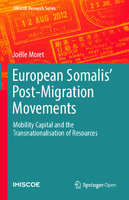European Somalis' Post-Migration Movements
Mobility Capital and the Transnationalisation of Resources
| dc.contributor.author | Moret, Joëlle | |
| dc.date.accessioned | 2020-03-18 13:36:15 | |
| dc.date.accessioned | 2020-04-01T09:01:29Z | |
| dc.date.available | 2020-04-01T09:01:29Z | |
| dc.date.issued | 2018 | |
| dc.identifier | 1007112 | |
| dc.identifier.uri | http://library.oapen.org/handle/20.500.12657/23049 | |
| dc.description.abstract | Based on a qualitative study on migrants of Somali origin who have settled in Europe for at least a decade, this open access book offers a ground-breaking exploration of the idea of mobility, both empirically and theoretically. It draws a comprehensive typology of the varied “post-migration mobility practices” developed by these migrants from their country of residence after having settled there. It argues that cross-border mobility may, under certain conditions, become a form of capital that can be employed to pursue advantages in transnational social fields. Anchored in rich empirical data, the book constitutes an innovative and successful attempt at theoretically linking the emerging field of “mobilities studies” with studies of migration, transnationalism and integration. It emphasises how the ability to be mobile may become a significant marker of social differentiation, alongside other social hierarchies. The “mobility capital” accumulated by some migrants is the cornerstone of strategies intended to negotiate inconsistent social positions in transnational social fields, challenging sedentarist and state-centred visions of social inequality. The migrants in the study are able to diversify the geographic and social fields in which they accumulate and circulate resources, and to benefit from this circulation by reinvesting them where they can best be valorised. The study sheds a different light on migrants who are often considered passive or problematic migrants/refugees in Europe, and demonstrates that mobility capital is not the prerogative of highly qualified elites: less privileged migrants also circulate in a globalised world, benefiting from being embedded in transnational social fields and from mobility practices over which they have gained some control. ; This open access book highlights the relevance of various types of cross-border movements in the post-migration lives of women and men of Somali origin Brings together conceptual insights from the migration studies and the mobilities studies to understand migrants' biographies Contributes to an emerging field that aims to trans-nationalize theories of social inequalities | |
| dc.language | English | |
| dc.relation.ispartofseries | IMISCOE Research Series | |
| dc.subject.classification | thema EDItEUR::J Society and Social Sciences::JB Society and culture: general::JBF Social and ethical issues | en_US |
| dc.subject.classification | thema EDItEUR::J Society and Social Sciences::JB Society and culture: general::JBF Social and ethical issues::JBFH Migration, immigration and emigration | en_US |
| dc.subject.classification | thema EDItEUR::5 Interest qualifiers::5P Relating to specific groups and cultures or social and cultural interests::5PB Relating to peoples: ethnic groups, indigenous peoples, cultures and other groupings of people::5PBC Relating to migrant groups / diaspora communities or peoples | en_US |
| dc.subject.classification | thema EDItEUR::J Society and Social Sciences::JH Sociology and anthropology::JHM Anthropology | en_US |
| dc.subject.other | Social sciences | |
| dc.subject.other | Emigration and immigration | |
| dc.subject.other | Social structure | |
| dc.subject.other | Social inequality | |
| dc.subject.other | Anthropology | |
| dc.title | European Somalis' Post-Migration Movements | |
| dc.title.alternative | Mobility Capital and the Transnationalisation of Resources | |
| dc.type | book | |
| oapen.identifier.doi | 10.1007/978-3-319-95660-2 | |
| oapen.relation.isPublishedBy | 6c6992af-b843-4f46-859c-f6e9998e40d5 | |
| oapen.pages | 213 | |
| oapen.place.publication | Cham |

